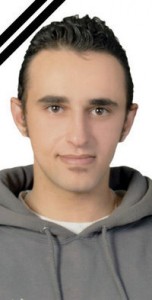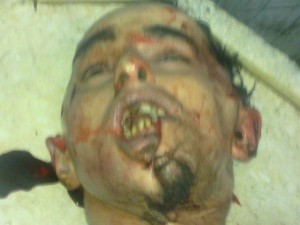The police and criminal injustice in Egypt
By Khaled Diab
Egyptian police and a decades-old emergency law stand in the dock of public opinion following a young man's alleged murder.
6 July 2010


The ‘before' and ‘after' shots looked like the makeover from hell. Before, we have a clean-cut young man who appears to be rather reserved and perhaps even somewhat shy. After, his once-youthful and pleasant face looks up with dead eyes, disfigured beyond recognition. It looks like it has caved in on itself, particularly around the mouth and jaw.
The cause of his death? It depends on whose side of the story you believe. According to eye-witnesses and Khaled Said's family, the 28-year-old Alexandrian was dragged out of an internet cafe and brutally beaten to death.
According to the official story, as outlined in two coroner's reports, he died of asphyxiation caused by his attempt to swallow a packet of ‘bungo' (a form of marijuana), presumably out of fear of being caught in possession. The post-mortem did concede that the young man had injuries resulting from a “collision with solid objects”, but claimed that these had not led to his death.
With public distrust of the police almost universal, the Egyptian public – not to mention human rights groups – are highly sceptical of the investigation's findings. Why? Well, the evidence doesn't really add up and the government has got form when it comes to covering up police brutality, which human rights groups say is “systematic” and “endemic”.
Many see this as a blatant attempt to posthumously tarnish the good name of a law-abiding young man – who was also reportedly apolitical – to mask the ugly handiwork of the regime's iron fist.
But if Said was not a political activist nor a criminal, why was he attacked by police in the first place?
The original theory doing the rounds was that he had objected to a heavy-handed police raid of the internet cafe and this provoked the fragile egos of the two plain-clothed officers. His family allege that this was retribution for his posting online of a video, which appears to show police officers dividing up the spoils of a drugs haul.
Since the dead can't protest, hundreds of thousands of Egyptians have refused to be cowed or intimidated into silence and have taken up Said's cause. A Facebook campaign set up to keep his memory alive and to seek justice for the young “martyr” has attracted nearly a quarter of a million members in Arabic and 25,000 in English.
And, unlike some earlier campaigns that did not venture far beyond cyberspace, this one has spilled out onto the Egyptian streets. In addition to the hundreds who attended Said's funeral, “flash mobs” have organised a number of successful protests. One of the most poignant was when thousands of people stood in a long chain along Alexandria's seafront – spaced five metres apart, in part to get around Egypt's draconian emergency law, which bans mass public assemblies – and stood silently or read their Qur'ans and Bibles.
In fact, silence has been the by-word. As one Egyptian commented on Facebook: “If speaking up only brings more violence, then silence will have to articulate our grief.”
Last Friday, large protests took place in a number of major Egyptian cities, with opposition figurehead and the main challenger to President Hosni Mubarak in next year's elections, Mohamed ElBaradei, the former IAEA chief, joining the Alexandria sit-in.
Despite this concerted show of public anger, the two officers allegedly behind Said's death remain on active duty.
“The nation is on the verge of social explosion, and amid all this, you'd expect the regime to act very cautiously regarding issues of political freedom and human rights to contain public anger, but they are just doing the exact opposite,” my brother, Osama, tells me in disbelief. “It feels bad to be ruled by authoritarianism, but it feels even worse to be ruled by stupid authoritarianism that is unable to think before it acts.”
Although Said's death is a huge tragedy for his family, if it helps to ram the final nail in the coffin of Egypt's emergency law, then this tragedy will not have been in vain. Three decades old, this draconian legislation has hung over the heads of Said's generation their entire lives and has effectively transformed Egypt into a police state.
The unconstitutional emergency law, which activists have been trying to reverse and repeal for years, grants the police and security services so much discretionary power that it has led to torture and even murder, with few perpetrators brought to justice. The Egyptian Organisation for Human Rights documented 46 torture cases and 17 cases of death between June 2008 to February 2009 alone.
“Under the state of emergency, the power of security forces has become absolute. It has become a hegemonic force in the country, even judicially,” says Bahey Eddin Hassan, general director of the Cairo Institute for Human Rights Studies. “Without a real balance of power, you do not have the rule of law and judicial independence. Without real balance, you lose the voice of the people.”
This column appeared in the Guardian newspaper's Comment is Free section on 12 May 2010. Read the full discussion here.



Pingback: police trial postponed in beating death of blogger Khaled Said « Object-Oriented Philosophy
Pingback: death of a blogger: “before” and “after” photos « Object-Oriented Philosophy
More debate on this article (in Arabic)here: http://www.shorouknews.com/ContentData.aspx?id=257544